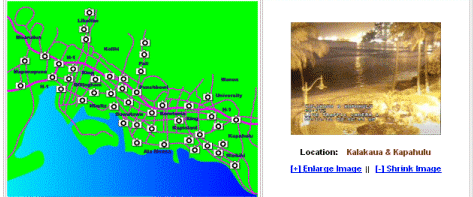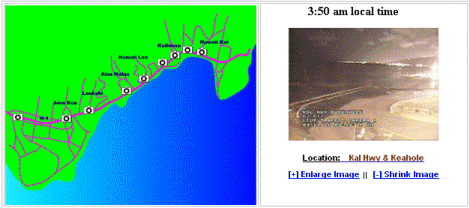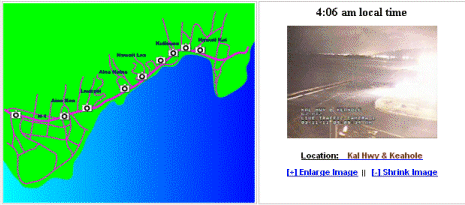 Analytics, Metrics and Music for the Radio Industry
Analytics, Metrics and Music for the Radio Industry
 An Indie Artist Pipeline to Internet Radio
An Indie Artist Pipeline to Internet Radio
 Radio Industry ROI Strategy
Radio Industry ROI Strategy
 A New Breed of Indie Artists
A New Breed of Indie Artists
Defending the Radio Industry
I've seen it again and frankly am tired of hearing people in the radio industry defending lackluster response to emergency situations. Ben Downs did, via a short article at Tom Taylor's Radio-Info newsletter this morning. For those who don't subscribe to this excellent radio trade journal (do so here), this was the headline: "'Getting a warning out is just the beginning' in an emergency, says Ben Downs."
|
"I too have some observations to pass on about radio response in emergencies. One goes back to 2005. The other event happened March 11 of this year, when a tsunami rolled across the Pacific Ocean heading for Hawaii after that devastating earthquake in Japan." |
From Radio-Info: The Texas broadcaster chips in with his own opinion about radio’s role and responsibility during floods, twisters, etc. – “I think Friday’s opinion piece from the listener in South Carolina blends a couple of issues to make a case. The number of people at a station at the onset of an emergency isn’t as important as the station’s ability to relay EAS messages. Early warnings and emergency messages need to originate from the local civil authorities and weather experts, not a weekend newsperson. When bad weather is closing in, radio stations via EAS are directly connected to the best people to issue a warning. And frankly, if (as he says) there’s only one person live in the studio at some point, that’s one more person than is sitting at all the cell sites combined. Getting a warning out is just the beginning. In a real disaster the warning to ‘duck’ needs to be followed by advice, relief locations, evacuation routes, survival instruction, volunteer coordination and hopefully...an all clear. You won’t be doing that 90 characters at a time."
|
I've never met Ben Downs, don't know his background, or believe in what he says above, but will relay points of view which I hold that are based on documented facts.
First, though, let's get this out of the way - the "opinion piece from the listener in South Carolina" is dismissed with ease, as is the case each time a negative opinion shows up about the radio industry. Trade magazines should spend more time investigating the reasons why radio is reported to have responded like this instead of simply waving off the offending statements.
Back to Mr. Downs. He stresses that "Early warnings and emergency messages need to originate from the local civil authorities and weather experts, not a weekend newsperson." Yes. But it is up to the weekend newsperson to make contact with authorities to relay the status of any emergency.
Ben Downs then concludes, "In a real disaster the warning to ‘duck’ needs to be followed by advice, relief locations, evacuation routes, survival instruction, volunteer coordination and hopefully...an all clear. You won’t be doing that 90 characters at a time." No. But you can do it with successive 90 character messages that paint the picture in a clear way - a point carrying even more emphasis by this side-note: My sister-in-law lives in Honolulu. On that morning when Hawaii was bracing for a tsunami (see below) she was visiting us in Cleveland, yet she still received early warning notifications via cellphone.
Onto the "facts." Every broadcaster who participated in warning the public about recent storms needs to be congratulated, to different degrees, as this former broadcaster from Greenville-Spartanburg, SC market shows. He is "involved in the emergency communications group for the hospitals in our area" and made this observation: "During one round of bad weather on the weekend, only one radio station in this market actually had a live person on the air from the local studios." This statement is what Ben Downs is referencing.
I too have some observations to pass on about radio response in emergencies. One goes back to 2005. The other event happened March 11 of this year, when a tsunami rolled across the Pacific Ocean heading for Hawaii after that devastating earthquake in Japan.
I will let my notes of what happened that day speak from here. These are unedited notes about the radio "reporting" that occurred on that morning, which was described by Clear Channel-owned Inside Radio under the headline "Radio responds to quake, tsunami." Its words are an excellent example of how the description at the Inside Radio web site is not exactly what happened on the airwaves in Hawaii.
Here is what Inside Radio had to say: "The role of radio in a disaster was once again illustrated early Friday morning as stations in Hawaii went wall-to-wall with tsunami warnings and coverage of the Japan earthquake. In a state where 17% of the population of Japanese descent, it’s big news. Cox Honolulu simulcast coverage on all six of its stations. Alaska stations aired warnings too, just days before the state’s annual tsunami drill. On the mainland, West Coast stations aired tsunami warnings and special reports, but fortunately damage was minor."
I lived in Hawaii awhile ago. On that March 11, 2011 morning, I tuned into the online broadcasts from a number of stations. Here is my account of what occurred. Read this time stamped documentation (complete with typos). See if it sounds like "Hawaii went wall-to-wall with tsunami warnings and coverage of the Japan earthquake."
Maybe a better way to phrase this is, see if the radio industry in Hawaii delivered information worthy of being called emergency coverage.
If anyone from any station mentioned would like to object to, or claim this account is not accurate, producing audio from that morning's broadcast would prove to be a simple way to settle this disagreement.
Note: The time stamp (Example: 07:20 3/11/2011) reflects Eastern Standard Time at my home. (Subtract 5 hours to get the "Local Time," which refers to the time in Hawaii.) The tsunami was estimated to hit the shores of Kauai at 3:12am local time, and Honolulu shortly after.
07:20 3/11/2011 [2:20am local time, 50 minutes before impact] - KHPR - public radio - network programming talking about Libya
07:21 3/11/2011
http://www.ksskradio.com/main.html - Clear Channel
Live host - talking about tsunami. informative, but I found it troubling that the hosts were taking callers' word that schools where closing. Where's the official, secure, notification from school officials.
07:48 3/11/2011 - KSSK is in a commercial break, 18 minutes prior to Tsunami (although, I was listening online, and the break may have automtically dumped out of on-air programming. It sounded like we joined a program in motion after the break.)
07:25 3/11/2011
http://www.kumu.com/
94.7 KUMU - playing music - Live host, short mention of "tsunami warning,' then back to music. No help
07:29 3/11/2011
Krater 96
http://krater96.com/
Live programming - recorded press conference in motion when I joined. Website had information, too. Host were keeping public informed.
07:31 3/11/2011
http://www.manaoradio.com/
94.5 Monao Radio - community radio
music - no help
07:38 3/11/2011 http://hawaiian105.com Hawaiian 105 - live hosts, information based - played press conference by Chip Cararey (sp) from the Tsunami Center break that was on KCCN at 2:23 - the hosts are talking about economic ramifications of the tsunami.
[nearly an hour later - local time] 3:32 - playing governor's press conference.
3:33 - plays the "Cox Emergency Coverage" ID - then goes to callers, speaking to a person who's in Japan via phone
3:38 - host suggests that people just "go to sleep" until 5am... when the all clear should be final. astounding!
3:40 - had a person discussing the small surge of water at Kalakaua and Kapahulu [the far-east end of Waikaki]
07:47 3/11/2011 - Krater is in a commercial break, 20 minutes before the Tsunmai is to hit.
07:51 3/11/2011
http://www.oldies1079honolulu.com
Kool Gold 107.9 - live programming about tsunami... informative.
07:54 3/11/2011
http://www.thefishhawaii.com/
The Fish 95.5 FM - live programming about tsunami - same recorded press conference of Governer that was airing on Kool Gold 107.9
07:56 3/11/2011
http://www.star1019.com/main.html
Star 101.9 - Live programming about tsunami, caller based. No real information being sent at 14 minutes before tsunami, but host is soliciting calls to "air your emotions by calling us." This is empty programming, void of useful information. The host was asked by a caller if a certain school was closed, he couldn't immediately confirm it. Then, started reading from the list of schools that are closed. this is 13 minutes before the tsunami is due to hit. What the hell is this for?
08:02 3/11/2011
http://kccnfm100.com/
KCCN FM 100
Hosts talking, joking, at 12 minutes before tsunami is to hit. Then one host turns to talking about road closers, and giving credit to authorities for a fine-tuned notification process. At 3:03, they play a Cox Radio "Emergency Coverage" ID for all Cox stations.
3:22 am reports from Kauai on the depth of water recession.
Online - at 3:23, sounds like an automatically scheduled online break.
08:06 3/11/2011
http://www.khvhradio.com/main.html
KHVH NewsRadio 830am - Clear Channel
Joined as the host was asking listeners to "keep them informed" of what is happening. Going to callers, not officials for information. As a news station, there was no "news" being reported... at 3:09 am local time, the host seemed to be stumbling for information to talk about. If there was any support staff available to him, it wasn't evident.
At 3:12 am (local time) the host joins Fox News - which is talking about financial advice - took a commercial break at 08:12 3/11/2011
KHVH host rejoins as that break starts. At 3:15am - Rick Hamada program - he's reading Tweets and emails.
The radio industry needs to face the fact that what's reported in its trade publications does not always reflect reality. There was a dreadful lack of reports from anyone in authority, only the continued replay of the Hawaiian Governor press conference held hours earlier. It was as if no one in the radio industry there thought of picking up a phone to get someone with authority on the air - or simply surfing to one of a few online traffic cameras, like I did.
The time has come to stop defending the radio industry's missteps and start producing the type of emergency response that was present prior to consolidation. Do that, and you won't have to worry about some listener in South Carolina reporting "..only one radio station in this market actually had a live person on the air from the local studios."
 |
 |
 |









